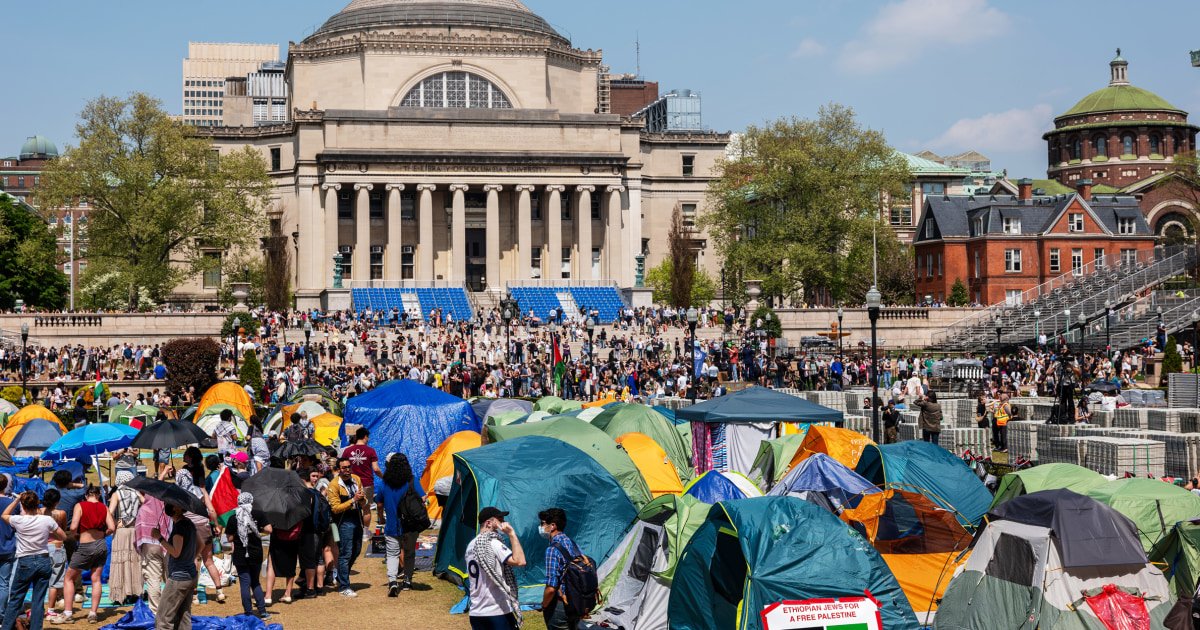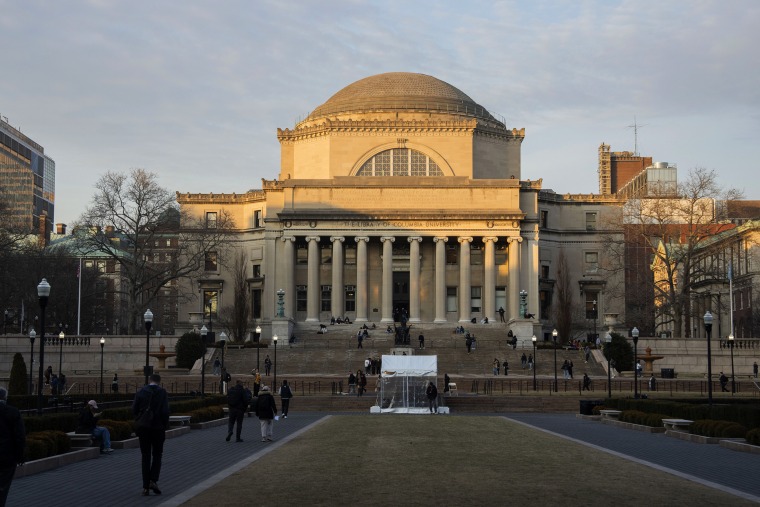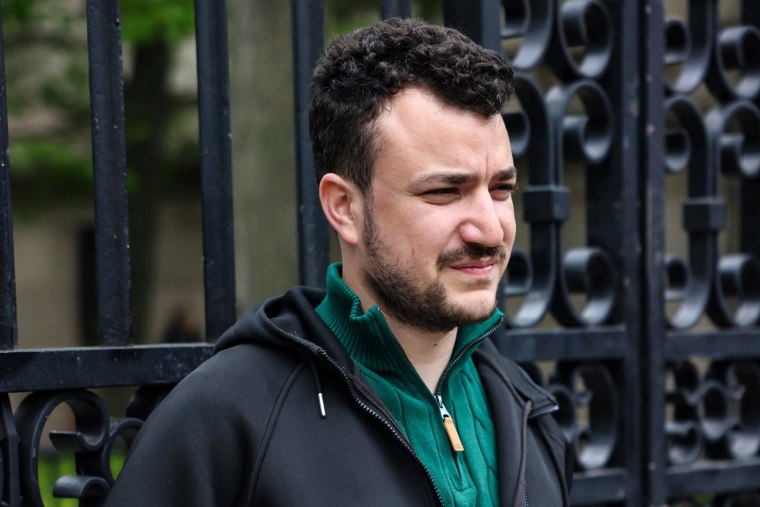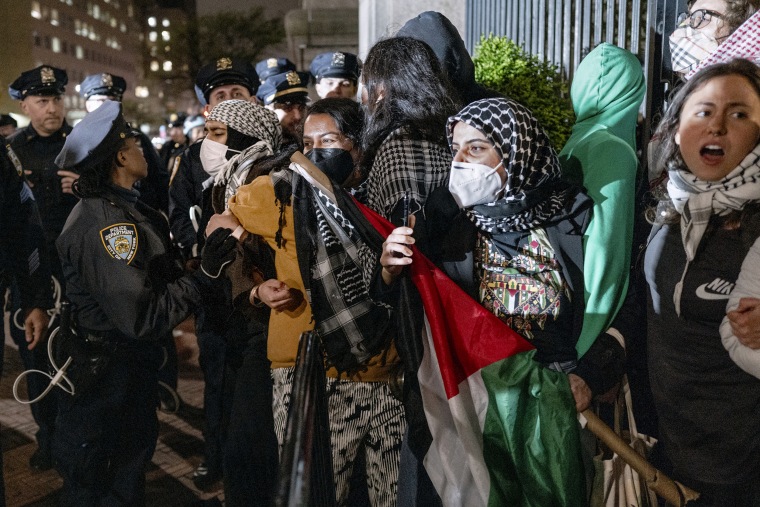Education
At Columbia University, Trump’s crackdown chills a fervent campus

The protests at Columbia University last spring were dogged: Students galvanized by the war in Gaza staged demonstrations for weeks on end, erected tent cities on campus lawns and annexed a university building.
But nearly a year later, as the university again finds itself at the center of unprecedented controversy, the student revolt that captivated the world appears to be largely absent.
Students say that amid the Trump administration’s crackdown on international student protesters, the harsh punishment of some of last year’s participants and the university’s new rules restricting campus demonstrations, speaking out simply isn’t worth the risk.

A freshman Columbia engineering student said he felt “proud” last year as he watched the protests from his home in Texas. But the student, who asked NBC News not to publish his name because of the sensitivity around the war in Gaza, said that while he’d like to join protests this year, he won’t. “It’s too dangerous, frankly,” the 18-year-old student said. “Not every family of the people that will go out to protest have the financial capabilities to be able to afford a lawyer in the event that you’re pressed charges.”
Sebastian Javadpoor, a senior who leads the university’s student-led Democratic club, agreed. Students are avoiding protests by choice, he said: “You have students who are not participating in protests because they’re terrified.”
On March 8, immigration authorities arrested Mahmoud Khalil, a Columbia graduate student who helped lead pro-Palestinian protests last year. Khalil, who was born in Syria and is of Palestinian descent, was living in university housing on a student visa with his American wife, who is eight months pregnant.

In the days that followed, another one of the university’s international students was arrested and a third fled to Canada, according to the Department of Homeland Security. And on Monday, a fourth student who has lived in the country since she was 7 years old sued the Trump administration after, she said, immigration authorities tried to deport her. The crackdown goes far beyond Columbia. In recent days, immigration authorities have arrested students at Georgetown University, Tufts University and the University of Alabama. NBC News obtained a video of authorities detaining Rumeysa Ozturk, the Tufts student, on Tuesday. It hows several Department of Homeland Security officers in plainclothes surrounding Ozturk, a Turkish national, grabbing her hands and taking her away as she screamed out in confusion.
Last Friday, threatened by the Trump administration with the loss of $400 million in federal research grants for “inaction in the face of persistent harassment of Jewish students,” the university acquiesced to sweeping changes.
Columbia agreed to ban masks at protests in most cases, enlist 36 new campus security officers — who, unlike previous security officers, will have the ability to arrest students — and hire a senior vice provost to oversee the Department of Middle East, South Asian and African studies, according to a document the university said it shared with the federal government and posted on its website Friday.
But students and faculty members protested the arrests and the changes in policy only a handful of times in recent weeks.
Unlike the sprawling demonstrations last year, a student protest on March 14 was confined to a small, tight space outside the university gates. It was surrounded by police barricades and lasted just a few hours.

On Monday, a few dozen faculty members held a vigil for democracy, which also took place off campus. A student activist group also encouraged students to sit out of classes and wear masks in defiance of the partial ban. Yet the response was muted, students said. Most of the dozens of students NBC News approached in recent weeks declined to speak on the record. Many said they feared speaking out would get them in trouble with the university. (Earlier this month, the university announced that it suspended or expelled some of the students who participated in the takeover of Hamilton Hall last year.)
Others said they feared that voicing their opinions would draw the ire of federal authorities. And some said they were simply fatigued by the controversies engulfing the university.
Allie Wong, a Ph.D. student who was arrested while protesting on campus in April, said the Trump administration’s actions and the university’s response have had a “tremendous chilling effect” on a campus known for challenging authority.
In 1968, Columbia students similarly took over Hamilton Hall to protest the U.S. government’s involvement in the Vietnam War, prompting more than 700 arrests. Not including last year, students blockaded or occupied the university academic building again at least four more times since then, according to the university’s website.
“There’s this pride that this is the epicenter of constructive dialogue and social change,” Wong said.

But things are different now, she said. “It’s not uncommon that people get arrested during protests,” she said. “It is uncommon that in the aftermath of protests, a year later, that the president of the United States is going through and actively targeting individuals to make a spectacle out of it.” A Justice Department spokesperson said the department “makes no apologies for its efforts to defend President Trump’s agenda in court and protect Jewish Americans from vile antisemitism.”
Ben Wizner, director of the American Civil Liberties Union’s Speech, Privacy, and Technology Project, said the pressure put on Columbia by the federal government is an attempt to bring universities “to heel” and poses grave First Amendment concerns for other schools.
“The goal is not just to chill that kind of speech at Columbia, but to chill it everywhere,” Wizner said, “and to communicate to every university, public and private, that if you don’t engage in these kinds of crackdowns on your own, we’re going to impose them with the threat of crippling funding cuts.”
Education Secretary Linda McMahon said in interviews this week that there was no timetable to restore the university’s funding but that Columbia was “on the right track.”
A Columbia spokesperson said in a statement that the university intends to combat antisemitism while protecting free expression. “We respect that there will be vigorous debate on campus about issues of academic freedom and protest, and we welcome that debate,” it said.
In a statement this week, Dr. Katrina Armstrong, the university’s interim president, reiterated her commitment to “seeing these changes implemented with the full support of Columbia’s senior leadership.”
“Any suggestion that these measures are illusory, or lack my personal support, is unequivocally false,” she wrote “These changes are real, and they are right for Columbia.”
Todd Wolfson, the president of the American Association of University Professors, said he was “disappointed” that Columbia didn’t push back against the administration’s demands. The AAUP, which defends the rights of faculty, sued several federal agencies Monday, arguing that the actions violated the professors’ right to free speech.
If the university won’t “stand up and fight back” against government incursions, he said, “then it’s likely we won’t have the kind of higher education which has been the engine of this country’s economy and democracy for the last 100 years.”
Michael Thaddeus, a professor of mathematics at Columbia who joined Monday’s protest, said the mood among the faculty is “profound alarm and dismay.”
Still, to an outsider, life on campus might appear status quo, he said.
“Classes are continuing, athletic competition is continuing, the libraries are open. I was watching a campus tour go by outside,” said Thaddeus. “It’s just a weird combination of normal and very abnormal.”
